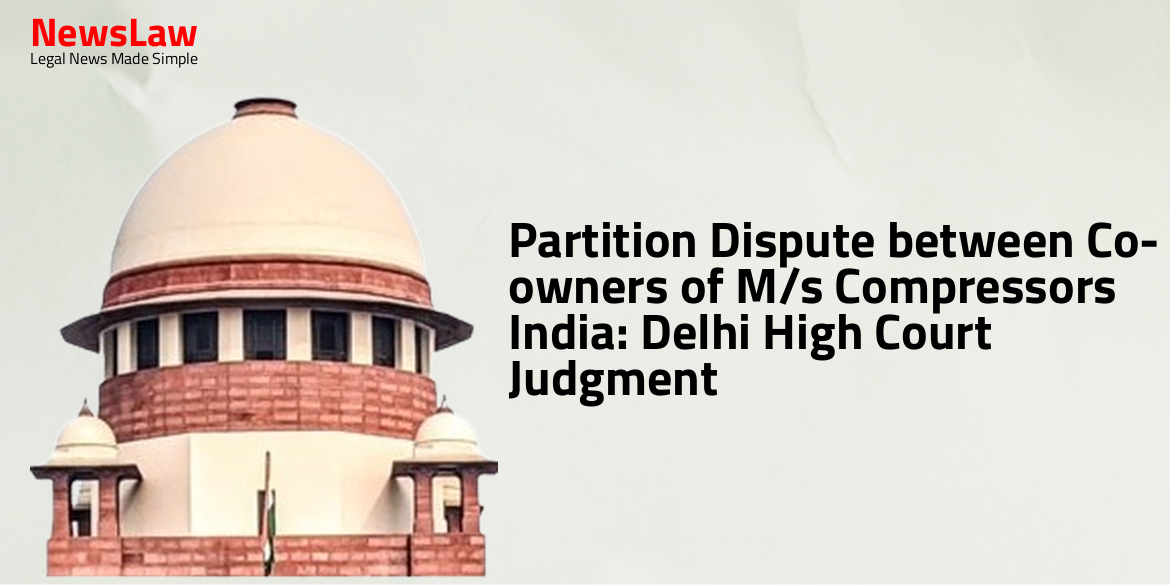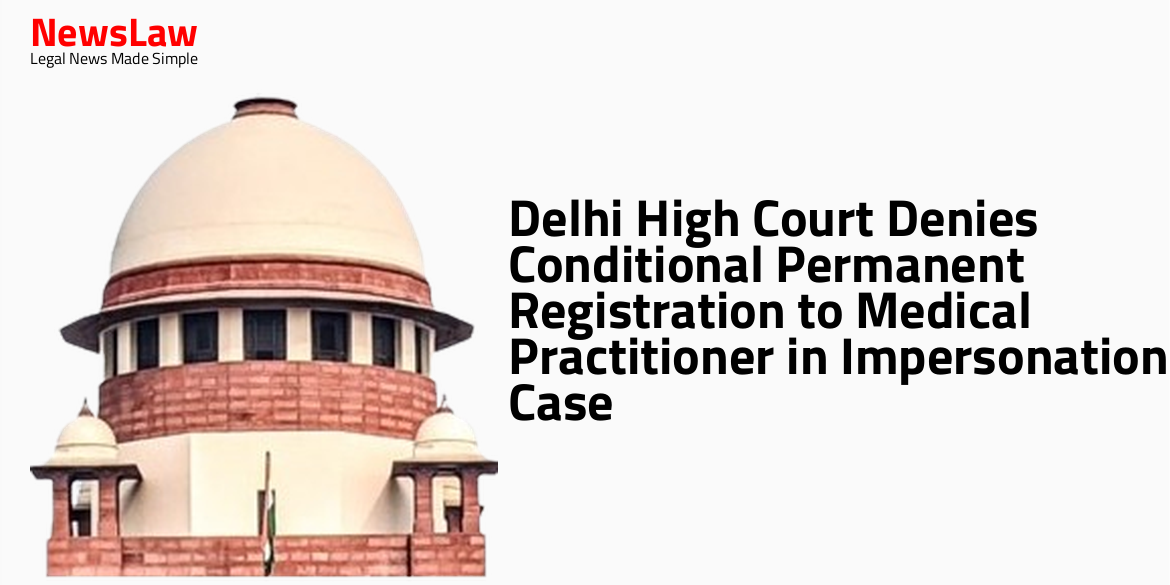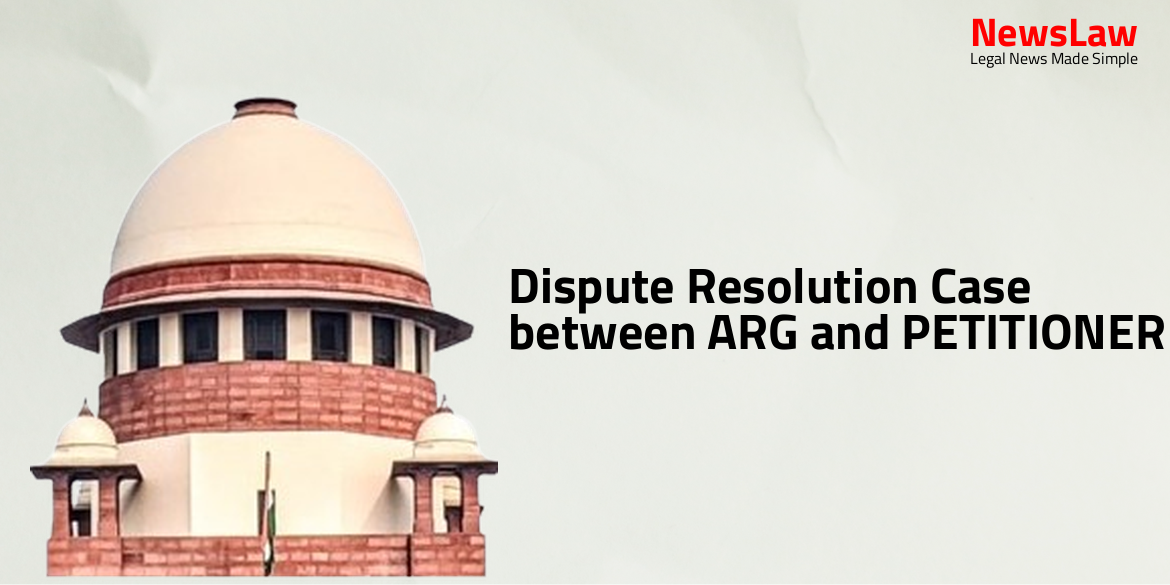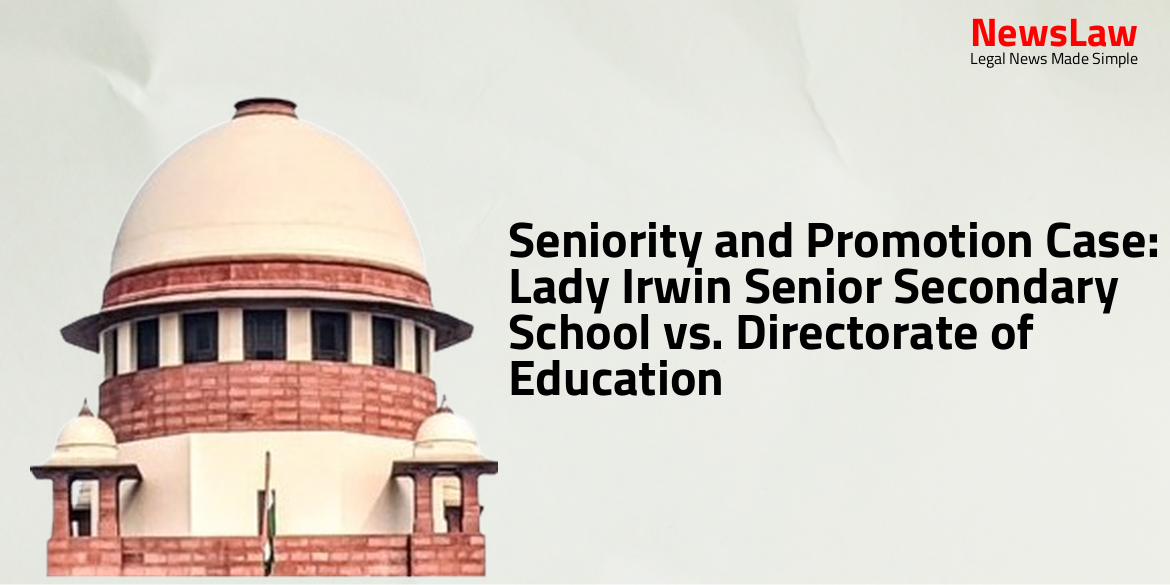In a recent judgment by the Delhi High Court, a partition dispute between co-owners of M/s Compressors India was resolved. The case involved Gurdial Singh and other co-owners of the business seeking partition of the suit property. The court’s decision sheds light on the complexities of co-ownership and the process of partitioning shared property. Let’s delve into the details of this significant legal ruling and its implications on property disputes.
Facts
- Defendant No 1 asserts receiving rental income from tenants after closure of partnership business.
- Defendant No 1 fails to repay Rs. 5,00,000 taken from Defendant No 2 in 1993.
- Defendant No 1 uses partnership firm’s electricity connection from 1996-2002 without payment.
- Defendant No 1 purchased a house with partnership funds but failed to repay the amount to the firm.
- In 1996, Defendant No 1 proposed Rs. 50,00,000 each to the Plaintiff and Defendant No 2 for front portion of the suit property.
- Defendant No 1 tried to pay electricity bills but refused to do so.
- Plaintiff sends legal notice for partnership dissolution and partition of suit property, which Defendant No 1 refuses.
- Partnership business continued till 1996, not 1992 as claimed by Plaintiff.
- Defendant No 1 in peaceful possession of front portion of suit property after agreed partition.
- Defendant No 1 alleges collusive filing of Suit by Plaintiff and Defendant No 2.
- Plaintiff denies cause of action disclosure and mentions bad joinder of parties in the Suit.
- Partnership Firm dissolved in 1992, machinery remains in suit property.
Issue
- The plaintiff denies the oral partition ever took place and reaffirms the prayer for partition of the suit property by metes and bounds.
- Key issues on pleadings were framed on 13.08.2013, including collusion with Defendant No 2, cause of action, time-barred suit, incorrect site plan, suppression of oral partition in 1995, proper valuation of the suit, and entitlement to relief of partition.
- Plaintiff testified as PW1 supporting assertions, and PW2/Narinder Singh corroborated the plaintiff’s testimony.
- Defendant No 1/Gurdial Singh appeared as D1W1 in support of his case and examined D1W2/Brij Mohan, Senior Supervisor with BSES, Rajdhani Power Ltd.
- Question for determination is whether the plaintiff had to pay Fixed Court Fee or Ad Valorem Court Fee.
Arguments
- It is denied that defendant No 1 waived their right to the machinery of the partnership firm in exchange for the front portion of the suit property.
- The plaintiff asserts no litigation regarding residential House No 311 with either defendant No 1 or defendant No 2.
- The parties have known D1W4/Tejender Pal Singh Bawa for four decades due to similar business engagements.
- The plaintiff denies issuing a Notice for partnership dissolution or that the defendants refused to accept it.
- The plaintiff and defendants were in possession of the suit property, taking separate possession for business convenience.
- Defendant No.1 took possession of the front portion following an oral partition, as testified by a witness.
- Denial that the partnership was dissolved in 1992 or that an oral partition agreement existed.
- Defendant No.2 has no objection to dividing the suit property into 1/3 shares each.
- Balbir Singh, a tenant in the property, confirmed defendant No.1 as the landlord who partitioned the property with a cement wall.
- The plaintiff and the defendants formed a partnership Firm, M/s Compressors India and jointly purchased the suit property.
- Defendant No 2 supporting the plaintiff does not make it a collusive suit.
- Plaintiff seeks partition of the suit property based on joint ownership with defendants as partners of the firm.
- Defendant’s claim of an oral partition in 1995 needs to be proven with evidence.
- The suit is not time-barred as the right to seek partition is a continuing cause of action.
- Defendant’s challenge on the correctness of the site plan filed by the plaintiff was not substantiated.
- Defendant’s claim of pre-partition of the property is not adequately supported.
- Plaintiff challenged the exclusive possession assumed by Defendant No 1/Gurdial Singh through a Writ Petition.
- Defendant No 1 in support of oral partition claim had a witness, Tejender Pal Singh Bawa, who is in a similar business.
- Plaintiff’s assertions in Written Submissions reiterated the claims made in the Plaint and Replication.
Analysis
- Defendant No 1, Gurdial Singh, raised a partition wall without measurement to separate front and back portions of the property to obtain electricity connection.
- The defendant, Gurdial Singh, sought to assess his portion of the property separately for house tax.
- The evidence does not support the existence of an oral partition claimed by Gurdial Singh in 1995.
- The plaintiff and defendants are entitled to 1/3 share each in the suit property.
- The parties had a partnership deed for conducting business from the suit property.
- Gurdial Singh’s exclusive possession of a portion does not constitute evidence of oral partition.
- The machinery of the partnership remained in the possession of the plaintiff and defendant No. 2.
- The defendants, including Gurdial Singh, are in possession of the suit property jointly.
- The dispute on electricity connection and taxes arose due to disagreements between the co-owners.
- The court concluded that Gurdial Singh assumed exclusive possession due to family disputes, not a formal partition.
- Ad valorem court fee under Section 7(iv)(b) of the Court Fees Act, 1870 applies when plaintiff seeks restoration of joint possession after being ousted from enjoyment of suit property.
- In cases where plaintiff asserts shared possession of property for partition, fixed court charge under Article 17(vi) of Schedule II of the Court Fees Act, 1870 is applicable.
- In co-ownership, the possession of one co-owner is considered the possession of all unless ouster or exclusion is proven.
Case Title: LATE AMAR SINGH THROUGH L.RS. Vs. GURDIAL SINGH AND ANOTHER (2024:DHC:4604)
Case Number: CS(OS)-807/2009



